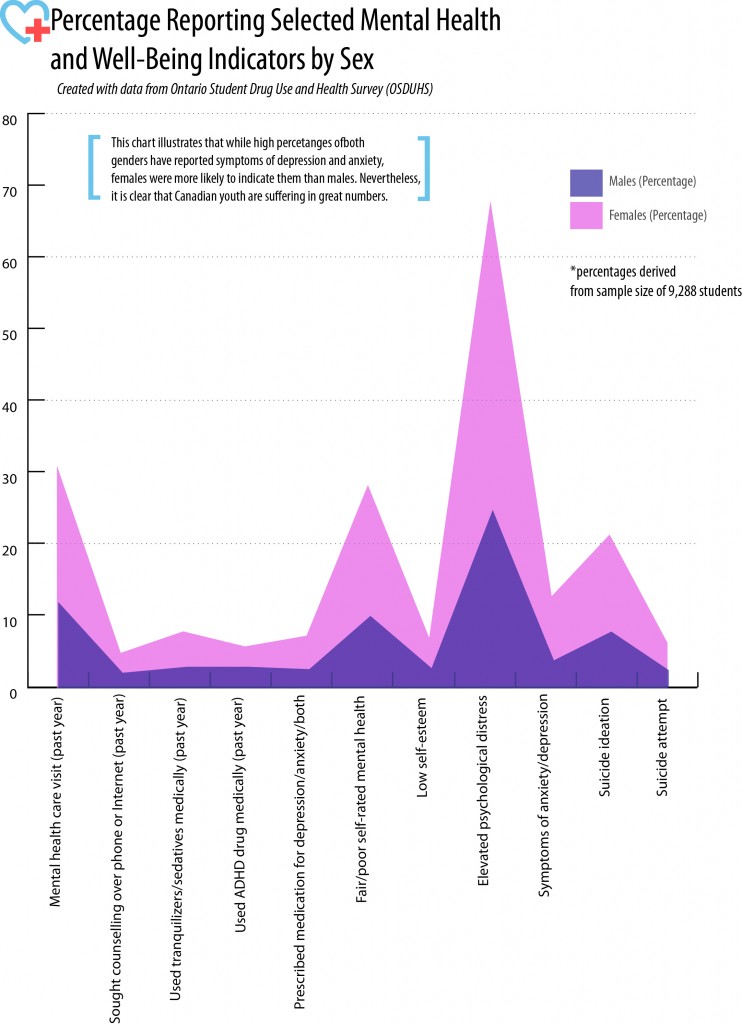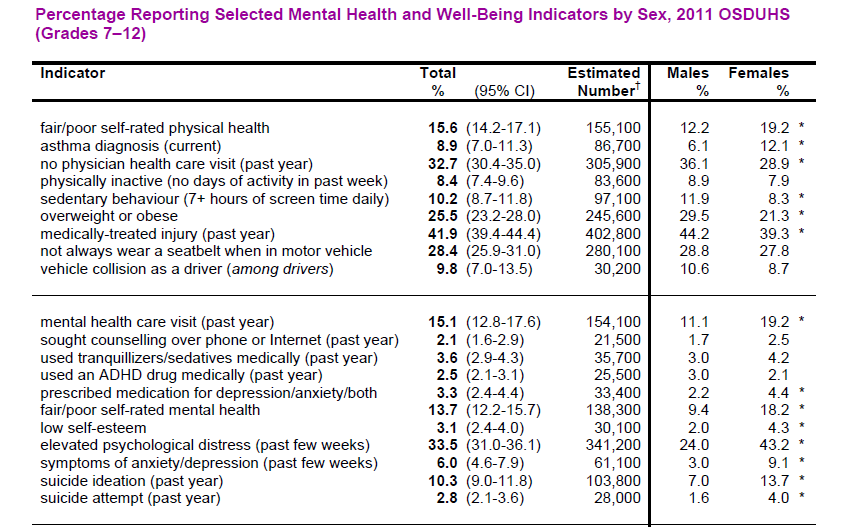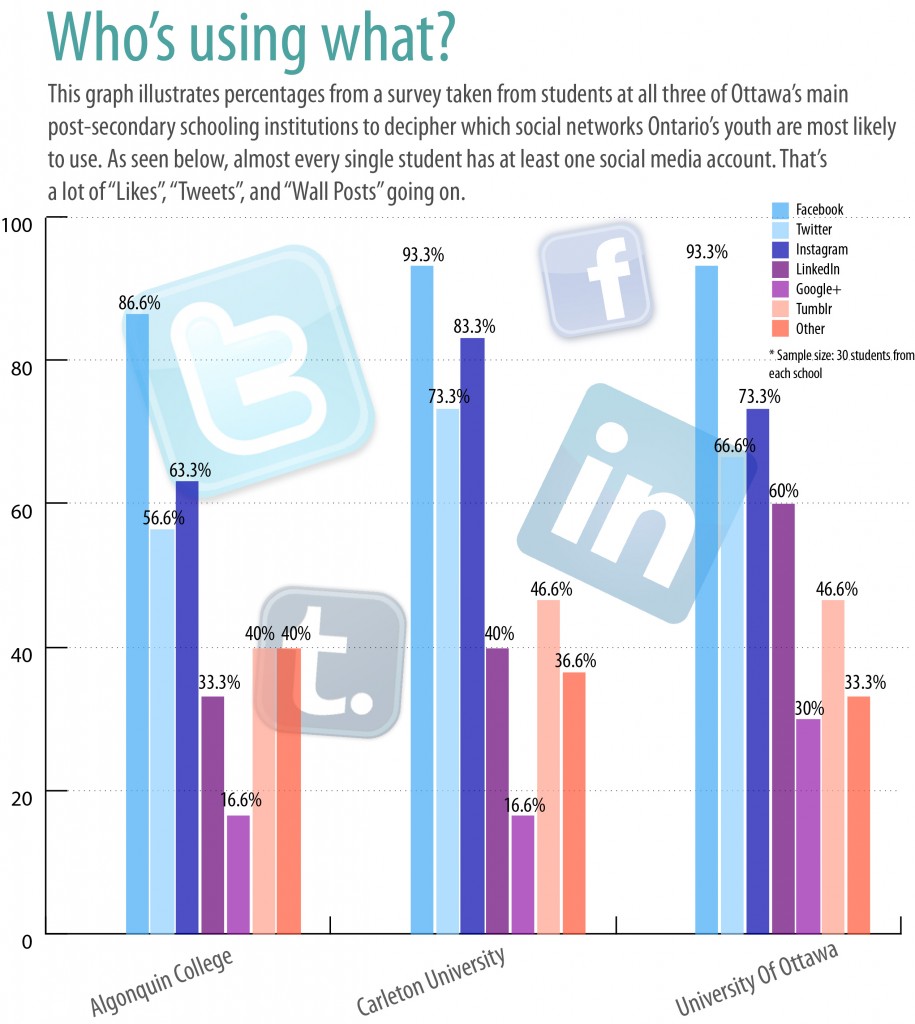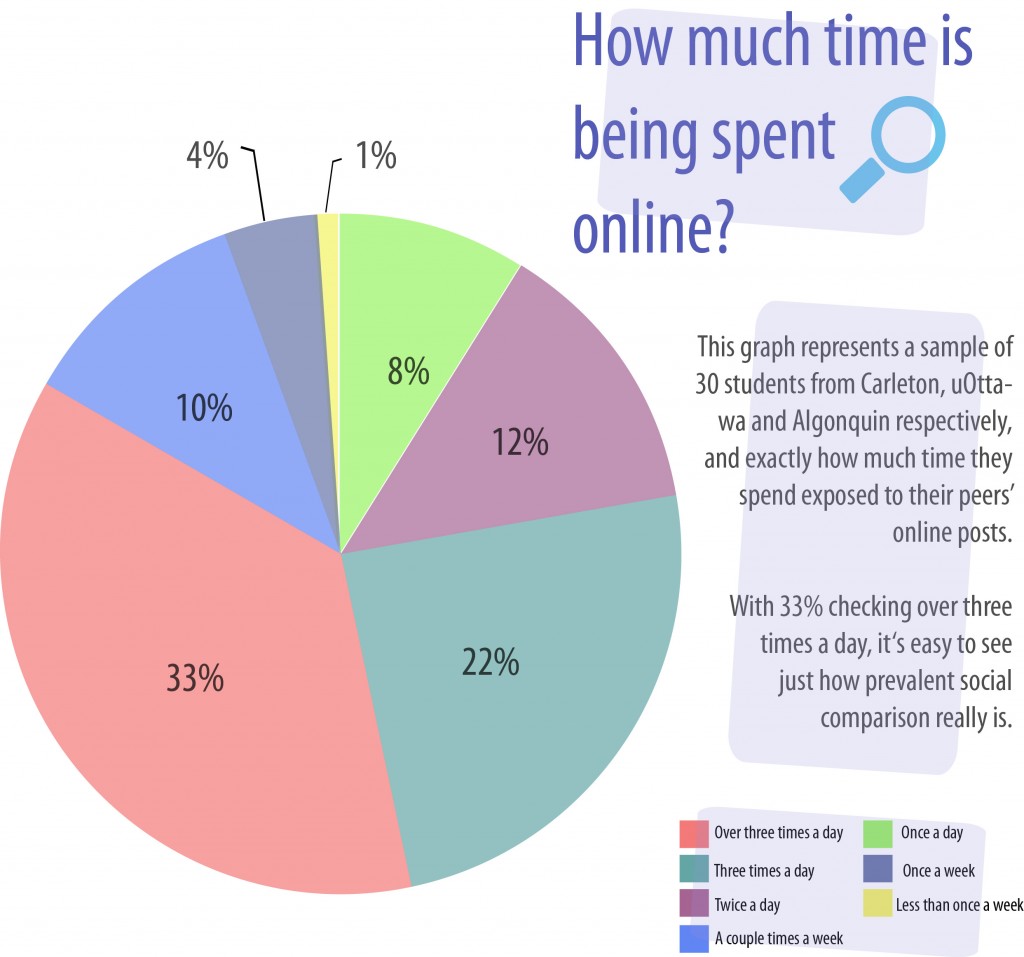By: Tamir Virani
Data set: Vital Signs – #GenerationalFlux report
Dec. 12, 2013
The Social Conundrum: Canadian youth, mental health and social media
From proudly sharing photos of our home-cooked meals to sending off a quick birthday message to that old co-worker, for most of us social media has been a convenient outlet to enhance our social lives.
No more, no less.
But as our Facebook, Twitter and Instagram profiles are slowly becoming more and more of an extension of our own personalities, accomplishments and lives, there have been those warning of the negative repercussions.
What harm could come from sharing pictures of your past trip to Maui, or tagging yourself and your friends at bar having a couple of drinks? Surely these innocent actions could have little to no ramifications.
Recent statistics released from a Vital Signs report would have you thinking differently.
In a study released by the organization entitled “#GenerationFlux”, a collection of data surrounding Canada’s youth was publicized to create a more accurate picture of current trends and issues facing this demographic.
An increased lag time between high school and post-secondary education and a lack of political and social engagement were cited amongst several other trending issues in Canada’s young people.
However amongst the flurry of data, one particular standout came under the health category.
The category focused on growing trends in mental health among youth, stating that 3.2 million Canadians within the 12 to 19 age were now at risk for developing severe mental health disorders such as depression, extreme stress and anxiety.
The report also stated that three out of four of those youth who would need specialized treatment would not actually receive it.

Despite being a quite sobering thought, how do these facts link back to society’s love affair with social media?
According to the repot, online social networking was listed as the number one most popular group activity for females. For males, it was listed as the second most popular activity right behind sports.

As the mental health of Canadian youth slowly deteriorates, the time spent exposed to our online personas has exponentially increased. Could there be a possible linkage?
Nina Baker, a graduate from the University of Ottawa and a student mentor for the school’s faculty of arts says social comparison theory could be that very link.
Social comparison theory, initially proposed by Leon Festinger, a social psychologist in 1954, states that individuals are likely to determine their own personal worth and affirmation based on how they stack up to their colleagues, friends and family members.
“Basically, everyone has an innate desire to be happy with their lives. That happiness is sometimes derived from judgements about our own lives compared to those around us,” Baker said.
“We make downward comparisons when we observe people who seem to have it worse off than we do,” she said. “But the main focus here falls when we make upwards comparisons, and see people who seem to have it better off than we do.”
From there, individuals fall into the snare of thinking they aren’t up to par.
As a student mentor, Baker has seen and had to deal with multiple cases of students coming in for help dealing with their anxiety and stress.
“It’s not just surrounding school and tests anymore,” Baker explained. “We’ve had people come into the centre stressed about what their friends were posting online. Sometimes it’s just a picture or a vague Facebook status, something simple that blows out of proportion.”
With social media being the perfect platform for people to post their accomplishments and for us to view them within seconds, this combination can lead to adverse results on our own self-esteems.
Believe or not, but that new job you just snagged at a cool start-up company and now proudly posted on Facebook about really does have the power to thrust someone a little bit more into their depression.
Suddenly logging in to Instagram to share your vacation photos seems a little bit more heavy-handed than before.

For Marie Kristine, a 23 year-old psychology undergraduate from the University of Ottawa, social media became more of an annoyance than a perk.
“I got rid of my Facebook at the time because there was this really bad culture surrounding it,” Kristine said. “There were people at school posting incriminating pictures of others and getting into trouble. I just didn’t want to get involved with that.”
Kristine ended up shutting herself off from the social media grid for an entire year, and ended up feeling a lot better during that time.
“It felt good to not have it. It was honestly relaxing and one less thing to have to worry about,” Kristine explained.
Kristine, who has since logged back on in order to keep in touch with distant family members would like to think she could do it again if she felt the same feelings coming on.
“If I had to, I think I could. But I would still be wondering what people were up to,” she said. “When you have social media accounts you feel in the loop, and without them I might feel left out.”
The feeling has a ring of truth not only for Kristine but a dozen other students who were asked about their online tendencies.
Katie Yelle, a 22 year old med school student, believes that she would be left out if she were to get rid of her social networking accounts.
“I feel like Facebook is important, it’s the way everyone communicates,” Yelle explained. “I wouldn’t be invited to events and I feel like I would miss out on a lot of personal interactions because of the communication aspect of it.”
Yelle also believes that sometimes social media has the power to make people feel like they aren’t where they should be in life.
“When a lot of people reach a certain age, they see all their friends on Facebook getting married or having children and that can definitely have an impact,” she said.
Amy Becklin, a current Algonquin student echoed Yelle’s statement to a tee.
“A lot of my friends from back home in the Maritimes are getting married and I’m kind of like, ‘maybe I should be getting married too, they’re the same age as me,’” Becklin said.
Another student, Veronique Duchesne believes that people need to be careful when using social media. “I think it’s just very easy for people to get lost in it,” Duchesne said.
Yelle addressed another concern that ties back to social comparison theory. The feeling of social exclusion. According to Baker, it is this very feeling that keeps individuals clicking the login button despite negative feelings they might experience once connected.
“When students came in to the student mentor centre to complain about Facebook, my first question is always ‘why don’t you spend less time online?’” Baker said. “Then they just say it’s because they would miss out on a lot.”

The New York Times recently published a piece on the idea of exclusion through social media sites linking it back to the same feelings of anxiety, envy and inadequacy that would arise from seeing “the cool and interesting activities that everyone else is up to.
Yelle agrees with a lot of the sentiments stated in the article.
“Many of my friends and I agree that as much as we enjoy being a part of the social Web, it can sometimes invoke a little sense of jealousy,” Yelle said. “I also think that with these sites people are obviously going to be putting their best foot forward with how they present themselves, and it’s important to remember that,” she said.
“No one will be posting the negative parts of their lives and so it just seems like everyone just has perfect lives.”
Yelle’s and her friends even suggested methods to try and counter act impending feelings of social comparison approaching.
“You just have to make it something that doesn’t consume your life. Like stashing your phone out of sight, limiting the amount of time on Facebook during the weekend or putting your phone on silent,” Yelle said.
These tips were highly reminiscent of the same advice shared by Algonquin graduates to current students at a recent networking event held on campus. The event was held in order to bring alumni back in order to share what they’ve learnt.
One of the focus topics was the importance of mental health.
Brandon Waselnuk, a graduate from the business and marketing program at Algonquin was one of the guest speakers invited for the event.
During the guest panel, he had stressed the importance of “technological shutdown” weekends, in which you simply unplug.
“People get consumed by Facebook and their other accounts,” Waselnuk said when asked about the tips he shared. “It’s important to just disconnect every now and then so you don’t get caught up or stressed about what other people are posting.”
Waselnuk also commented on the trap that many students find themselves in when navigating their online profiles. “Don’t take it too seriously and don’t try to be someone you’re not. Just go at your own pace and do worry about where others are at in their lives,” he said.
The Vital Signs report went on to claim that Canadian’s youth have surpassed adult groups in terms of mental and functional health problems. It listed “constant interactions with technology contribute to an unprecedented physical and mental health issues.”
Facilities devoted to mental health in Ottawa, Ontario. According to Vital Signs, only 15% of students reported visiting mental health facilities in the past year, despite the abundance of them in most Ontario cities.
Kristine agreed, “Younger people on Facebook and other social media sites would have issues. You’re less established and have a less defined sense of self,” she said.
“In that situation, seeing peers post amazing things about their lives would probably have a bigger impact on you and lead you to feeling worse about yourself. It would have a negative impact.”
While the statistics in the Vital Signs report may not have reflected a positive state for mental health amongst Canada’s youth, it has functioned as a wakeup call for some.
“It’s sad to see that young people are so affected by [social media],” Kristine said. “At the same time, it does show that there’s a problem. [The report] will get people talking, which is essentially a good thing.”
Indeed, the state of Canadian youth mental health may be problematic at the moment. But where’s there’s a problem, there’s also usually a solution. “Creating a dialogue is the first step,” Kristine said.
Until then, be sure to practice safe posting.
